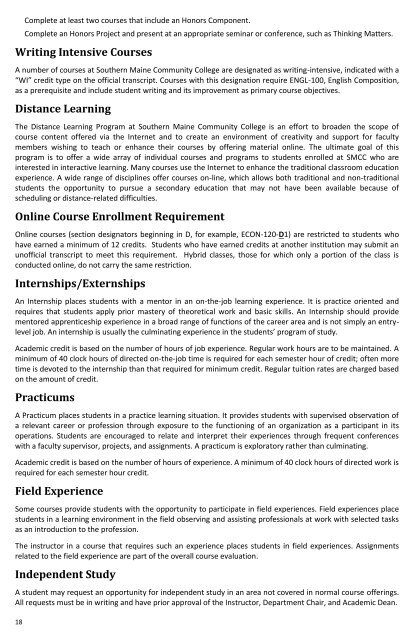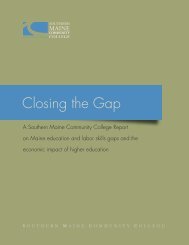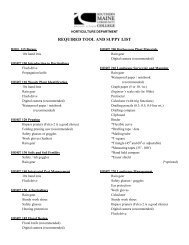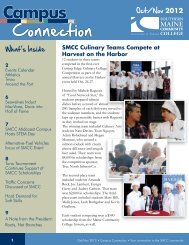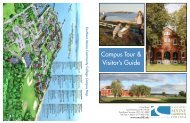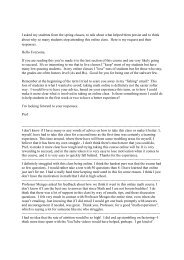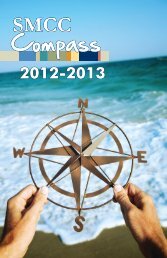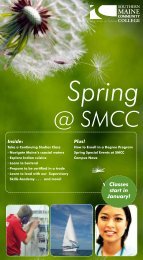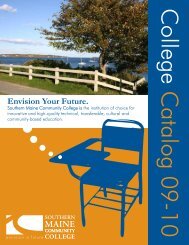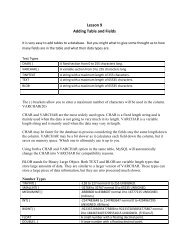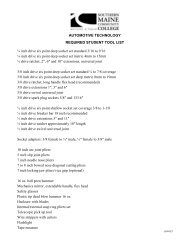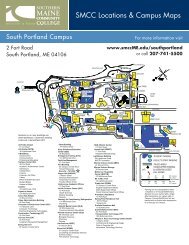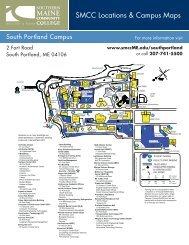SMCC Catalog 2013 - 2014 - Southern Maine Community College
SMCC Catalog 2013 - 2014 - Southern Maine Community College
SMCC Catalog 2013 - 2014 - Southern Maine Community College
Create successful ePaper yourself
Turn your PDF publications into a flip-book with our unique Google optimized e-Paper software.
18<br />
Complete at least two courses that include an Honors Component.<br />
Complete an Honors Project and present at an appropriate seminar or conference, such as Thinking Matters.<br />
Writing Intensive Courses<br />
A number of courses at <strong>Southern</strong> <strong>Maine</strong> <strong>Community</strong> <strong>College</strong> are designated as writing-intensive, indicated with a<br />
“WI” credit type on the official transcript. Courses with this designation require ENGL-100, English Composition,<br />
as a prerequisite and include student writing and its improvement as primary course objectives.<br />
Distance Learning<br />
The Distance Learning Program at <strong>Southern</strong> <strong>Maine</strong> <strong>Community</strong> <strong>College</strong> is an effort to broaden the scope of<br />
course content offered via the Internet and to create an environment of creativity and support for faculty<br />
members wishing to teach or enhance their courses by offering material online. The ultimate goal of this<br />
program is to offer a wide array of individual courses and programs to students enrolled at <strong>SMCC</strong> who are<br />
interested in interactive learning. Many courses use the Internet to enhance the traditional classroom education<br />
experience. A wide range of disciplines offer courses on-line, which allows both traditional and non-traditional<br />
students the opportunity to pursue a secondary education that may not have been available because of<br />
scheduling or distance-related difficulties.<br />
Online Course Enrollment Requirement<br />
Online courses (section designators beginning in D, for example, ECON-120-D1) are restricted to students who<br />
have earned a minimum of 12 credits. Students who have earned credits at another institution may submit an<br />
unofficial transcript to meet this requirement. Hybrid classes, those for which only a portion of the class is<br />
conducted online, do not carry the same restriction.<br />
Internships/Externships<br />
An Internship places students with a mentor in an on-the-job learning experience. It is practice oriented and<br />
requires that students apply prior mastery of theoretical work and basic skills. An Internship should provide<br />
mentored apprenticeship experience in a broad range of functions of the career area and is not simply an entrylevel<br />
job. An internship is usually the culminating experience in the students’ program of study.<br />
Academic credit is based on the number of hours of job experience. Regular work hours are to be maintained. A<br />
minimum of 40 clock hours of directed on-the-job time is required for each semester hour of credit; often more<br />
time is devoted to the internship than that required for minimum credit. Regular tuition rates are charged based<br />
on the amount of credit.<br />
Practicums<br />
A Practicum places students in a practice learning situation. It provides students with supervised observation of<br />
a relevant career or profession through exposure to the functioning of an organization as a participant in its<br />
operations. Students are encouraged to relate and interpret their experiences through frequent conferences<br />
with a faculty supervisor, projects, and assignments. A practicum is exploratory rather than culminating.<br />
Academic credit is based on the number of hours of experience. A minimum of 40 clock hours of directed work is<br />
required for each semester hour credit.<br />
Field Experience<br />
Some courses provide students with the opportunity to participate in field experiences. Field experiences place<br />
students in a learning environment in the field observing and assisting professionals at work with selected tasks<br />
as an introduction to the profession.<br />
The instructor in a course that requires such an experience places students in field experiences. Assignments<br />
related to the field experience are part of the overall course evaluation.<br />
Independent Study<br />
A student may request an opportunity for independent study in an area not covered in normal course offerings.<br />
All requests must be in writing and have prior approval of the Instructor, Department Chair, and Academic Dean.


